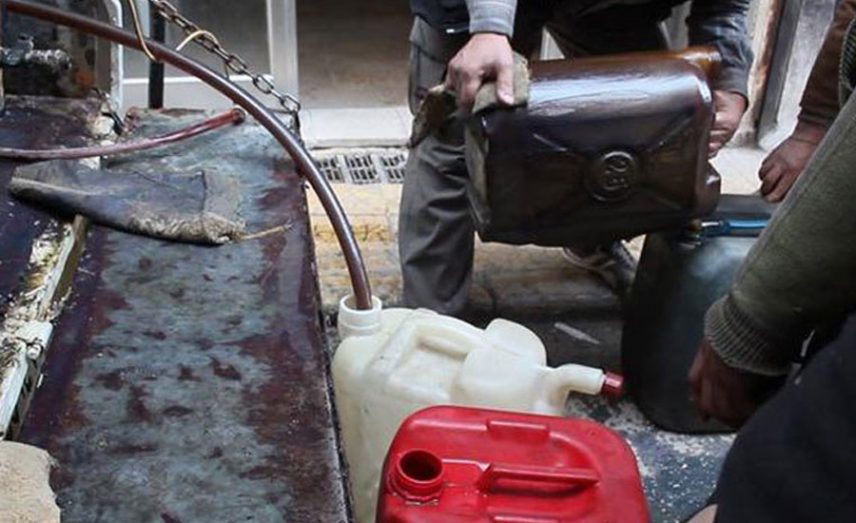The supply of fuel from Syria’s eastern wells has halted to areas under opposition control in the southern region after President Bashar al-Assad’s forces and allied militias took control of the area extending east of Suweida province.
The “liberated” areas in Daraa have been forced to depend on fuel passing through Syrian regime-held areas after the suspension of “Anbari” fuel smuggled from Islamic State-held areas. Anbari fuel had been Daraa’s primary source due to its availability and low price, making it a “safety valve” for locals because of its role in guarding against a monopoly by the regime and traders.
Although fuel is still available in the markets despite the increase in price, the consequences of the hike may not be normal at all, says Adnan al-Jabawi, a fuel seller in the Daraa countryside. He says that many traders began to horde fuel, especially mazut, hours after desert roads were cut off completely.
“With the advances of Assad’s forces, we learned from smugglers that the roads have become difficult and could be cut off at any moment, which has been reflected in the prices which have increased by about double, while there is less [fuel] available in the markets,” he told Enab Baladi.
A liter of mazut costs more than 500 Syrian pounds, a steep rise from about 250 pounds in recent months.
Jabawi expressed his fear about losing control over mazut resources, especially with the winter months approaching.
“The regime can, at any moment, stop the supply of mazut, and then residents will have no alternative solutions, causing a crisis that will not be easy,” he said.
The monopoly could hit all aspects of life in opposition-controlled areas and will give the regime a bargaining chip in their favor.
What are the solutions?
Jabawi believes that there are few solutions available to overcome this crisis, saying that people, organizations and rebel groups need to control the consumption of fuel as much as possible and prepare for it to be cut off at any moment.
Farmer Eyad Kiwan confirmed what Jabawi said and pointed out that the swift rise in the price of fuel coincided with the vegetable harvesting season among farmers.
He said: “We depend on fuel on a basic level, whether for our machines or electrical generators, which has reflected on the price of vegetables, which have exceeded market capacity and led to people and traders being reluctant to buy.”
Kiwan and a number of farmers have been forced to stop their harvest to prevent additional losses. The farmer believed that the future would see a major reluctance among growers or a serious rise in prices if a radical solution is not found for the fuel crisis, whether a reduction in the prices or preventing a monopoly by any one party.
The loss of control over fuel supplies reveals the extent of the fragility of self-sufficiency in these areas isolated from their geographical surroundings and other Syrian provinces.
The fuel crisis can be considered an alarm bell for those calling for cessation of hostilities and self-administration, as the Syrian environment is not suitable for partition and each region is unable to revive itself on its own without the other areas.
This article was translated and edited by The Syrian Observer. Responsibility for the information and views set out in this article lies entirely with the author.


